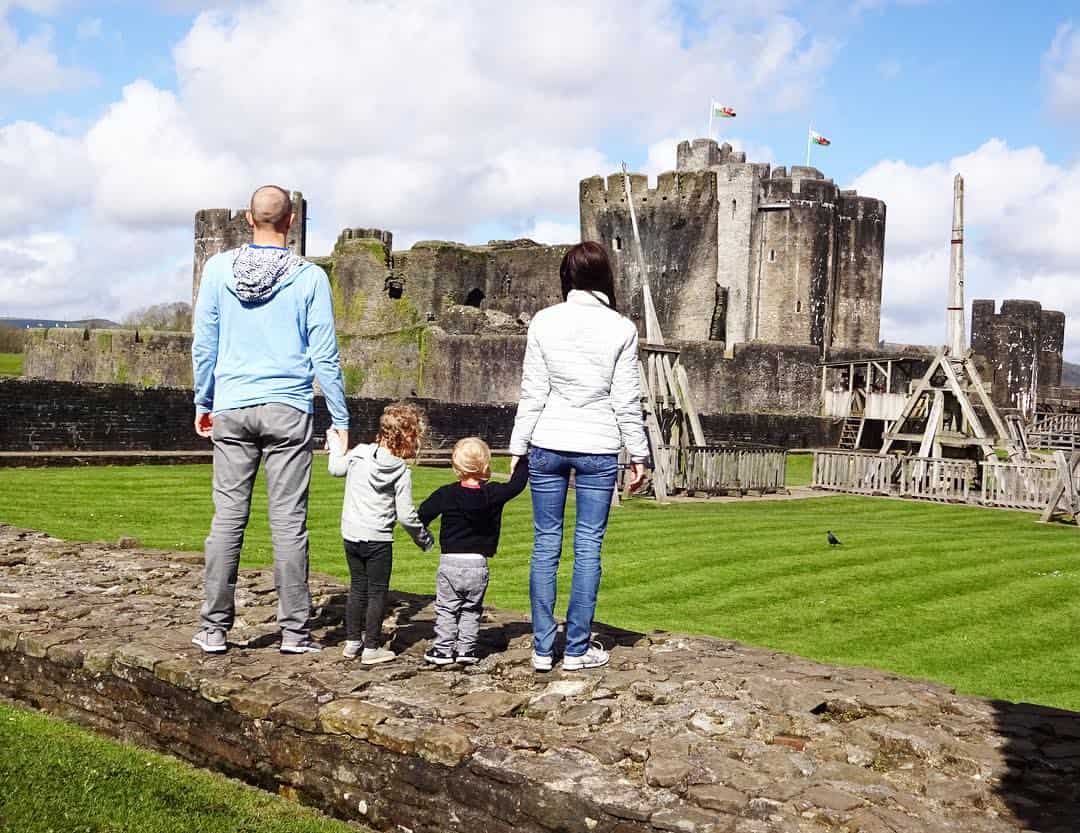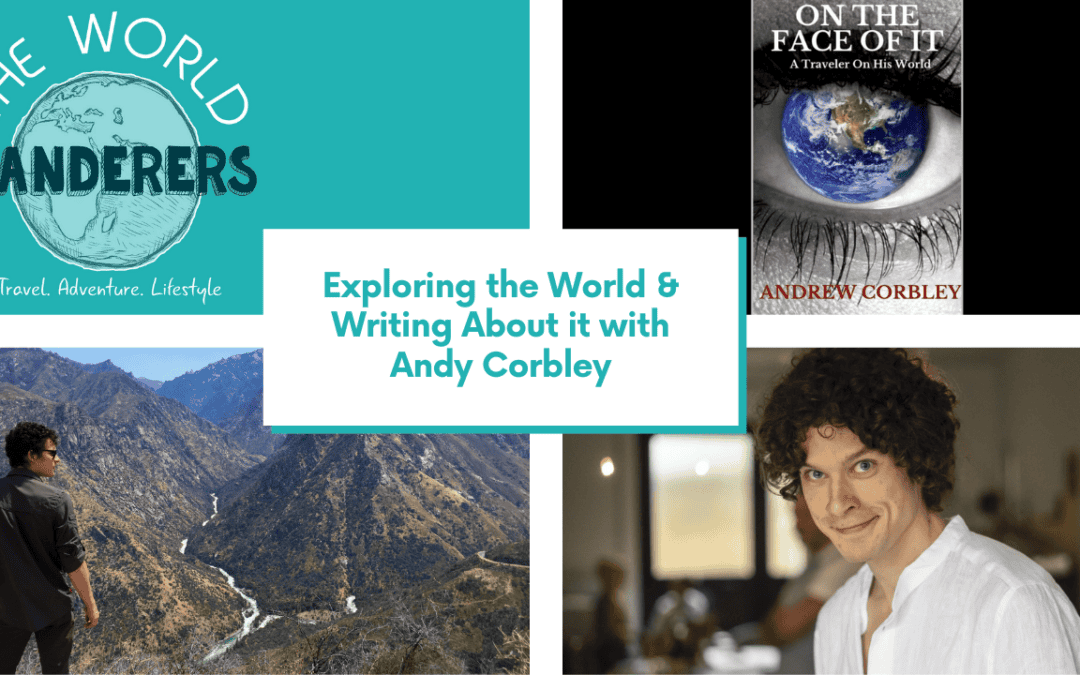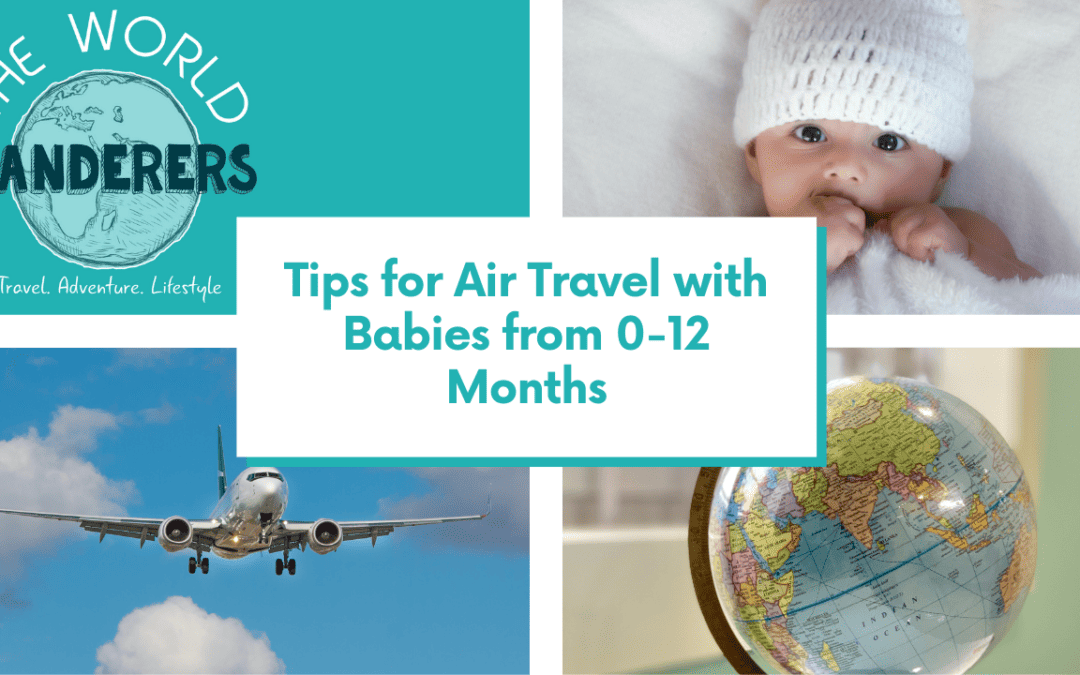Download directly, on iTunes, or Stitcher.
Jake and Michelle Schomp thought they would have to temporarily abandon their love of travel and settle down with corporate jobs once they had kids. After deciding they didn’t want to miss out on spending more time with their children, they realized there was no better time than the present to show them what the world has to offer!
They’ve since been travelling with their toddlers Henley, 4, and Jagger, 2, to places like East Coast USA, Hawaii, New Zealand, and Cambodia, capturing their adventures on Instagram, YouTube and Facebook as the “Retired Toddlers.” We recently had the opportunity to meet the awesome toddlers and their parents when they invited us to hang out with them in Bali.
On this episode, Jake and Michelle talk about the decisions you make as a parent when it comes to long term travel with kids, the benefits of being able to spend time together as a young family, and what it’s like to be on the road with toddlers.
Enjoy!
What we talk about:
- Making the decision to take time off work to spend time and travel with kids
- What it’s like to make the transition from traveling as a couple to traveling as a family with young children
- The social benefits of introducing children to the world around them at a young age
- The surprising amount of detail kids can remember and the pros of traveling as a young family
- Rediscovering the fun of activities when experiencing them through your children’s eyes
- The additional warmth, openness and love you experience from locals when you travel with kids
- Some of the challenges with raising young children abroad (think potty training!)
- Stories from other traveling families Jake, Michelle and the toddlers have met while traveling abroad
- Giving your kids the tools to share their unique experiences with peers at school
- Helping your children understand their place in the culture and experiences happening around them
- Schooling options for kids abroad and fostering a sense of community
- The benefits of getting to watch young children grow up in front of your eyes
- The kid friendly gear they make sure they always have with them
- Adjusting your travel pace when you travel with kids and stopping to appreciate the smaller things
If you enjoy the podcast, join the community on Facebook, Instagram + sign up for the monthly newsletter.
This episode of the podcast is brought to you by YOU – this listener of the show! We just changed up our rewards on Patreon, and becoming a supporter of the show has never been better. Did someone say postcard from an exotic location? If you want to support the ongoing production of the show, please visit www.theworldwanderers.com/patreon/
Music Credits:
www.bensound.com
Connect with Michelle, Jake and the Retired Toddlers:
You can check out what Henley and Jagger are getting up to with their parents by finding the Retired Toddlers on Facebook, Instagram and Youtube!
Digital Nomad Life: Travel with Kids: Jake and Michelle Schomp, Parents of the “Retired Toddlers”
Welcome to the World Wanderers podcast, your source for travel stories, travel destinations, and travel philosophy. We are your hosts Ryan and Amanda, and we will be taking you on today’s adventure as we speak with this week’s guests.
In this episode, we introduce you to Jake and Michelle Schomp from the YouTube channel “Retired Toddlers” and dive deeper into what it means to be a parent on the road. We are looking at traveling through the eyes of Henley and Jagger, their two little nomads.
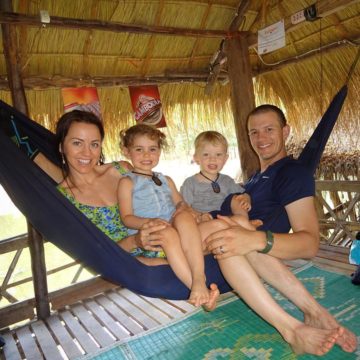
We believe there are many digital nomads out there seeking a way to continue on this wonderful path while raising a family, and these two share in detail how they did it. We discuss their highs and lows, and we get some advice on how to make this possible and make it the most amazing experience in life because it truly can be. Sharing traveling with little ones is quite challenging and life-changing at the same time.
As an encouragement to young parents around the world who are considering making this transition, they share their daily adventures and fun travels on their Instagram account and Youtube channel “Retired Toddlers”. For a glimpse into the life of a digital nomad, you can take a look at their Instagram and YouTube accounts.
Making the decision to take time off work to spend time and travel with kids
Despite being known for raising their family in a nomadic way, Jake and Michelle traveled well before they even thought of having children. The two of them are passionate travelers. They had been traveling around the world by themselves before they embarked on all these crazy toddler adventures.
“I think we each had a little bit of a travel bug, and then when we both combined it, it just kind of blew up.”
Since it was a fairly popular opinion, almost myth, that it is impossible to travel after having children, they felt like they had to travel as much as possible before having a family.
“I think that the idea that you have to get all your travels out of your system before you have kids because you’re going to have essentially an 18 to 22 year gap where you can’t do any extensive travel is a pretty common way of thinking. It is among our social circles and amongst all the people we hang out with. It seems like it’s become just the norm to settle in your nest and stay at home for 20 years. That’s really what we assumed we would kind of do.” – Michelle and Jake started their story.
Then, once we extended our family, the dynamics changed. Michelle shares with us the exact moment that she realized what the right thing to do was. She describes how one crucial conversation with her mom finally settled some things in her head.
“It started with my mom. I had a conversation with my mom about when I would spend more time with the kids rather than traveling so much for work, you know, because traveling a lot every week for work, you miss out on a lot of those little moments with the kids.
You’re going to miss out on these very early years when the kids are no less than four years old. That’s when the kids need you the most. They need your guidance. They need you around. That stuck with me, and it inspired me to take time off from my heavy-duty consulting. They want you around.” – Michelle.
What it’s like to make the transition from traveling as a couple to traveling as a family with young children
The decision to spend more time together as a family naturally led to the start of travel. They both decided to quit their full-time jobs and say that was a liberating thing to do. They simply had to plan their first trip, and from there, everything fell into place.
“I decided I would take time off from full-time working. It was just a natural next step that we would spend some time traveling. We felt like we weren’t locked into any specific place. And we felt like we had a lot of liberties to take off with the kids.” – Jake
While they say that traveling today is so different from before, it has been very enjoyable. Watching the children grow every day and spending every second with them makes the entire experience priceless, which is why they choose to do all of this.
“I’ve enjoyed every minute that I’ve spent with the kids on this trip. I feel like we’ve had so much quality time together. It’s just been priceless for me.” – Jake.
The social benefits of introducing children to the world around them at a young age
After meeting the toddlers, we were also curious about what kind of impact this kind of lifestyle had on them. It will also surprise you to learn how the discovery of the world at such an early age has impacted their development and the social skills they have gained.
“They’re both very social. I don’t know if that comes from us traveling a lot or if that’s just their personalities; it’s kind of hard to say. We definitely put them in a lot of different social situations and environments where they’re meeting all different types of people.”
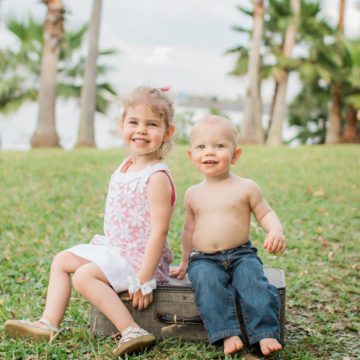
They describe their reactions to seeing things happen around them, the experience of meeting new people every day, and how that builds into their character. It is fascinating to see this happen right in front of your eyes.
“I think because Jake and I get excited about meeting new people and hearing other stories or just meeting up with friends, they do too. And they kind of feed off that excitement. So if they hear we have friends over or we’re having people over, we get to go meet somebody for lunch, as we did with you guys, they get really excited about that too.”
The fact that they have had this experience, even if it can take a lot of bravery, is very beneficial, as they say. So far, Henley and Jagger seem to be handling the experience quite well and have learned so much for toddlers their age. Since this is the first thing they have learned, it has become the norm for them.
“They are spending a lot more time around adults and older people. So maybe it is part of their normal.”
The surprising amount of detail kids can remember and the pros of traveling as a young family.
Another thing you would all be surprised by is the massive amount of details a toddler can remember. Initially, the parents did not think that they would have memories of their travels because the children are so young. However, children are like sponges and absorb everything around them.
“You hear a lot. Well, how would you take them this young? They’re not going to remember anything. And it was actually one of my thoughts.”
In making their first memories, Jake and Michelle hope they have provided a strong foundation that their children can hold onto. Their first memories will be shaped by what they are experiencing right now.
“Henley remembers an amazing amount of details and an amazing amount of stuff from things that we did a year ago that we haven’t talked about since then. Will she remember them in five years or ten years? I don’t know, but I know that she grasps the feelings, the sights, the sounds, the fact that we’re all together and kind of builds that foundation. So I think that’s a huge reason to do it.”
Rediscovering the fun of activities when experiencing them through your children’s eyes
Jake and Michelle also share in what ways the toddlers have shaped their experience as well. Now, everything is a whole different experience once you can see it through their eyes.
“It’s amusing to see it through their eyes. It’s a whole different element of travel. It has been a very different type of travel where of course, we worry about everything a little bit more with the kids.”
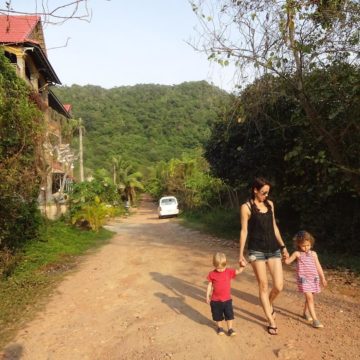
Everything is relaxed now, and they have learned to enjoy so much more. These trips really make you stop and think and appreciate the things around you. Take in everything a bit more, and have fun with the simple things you might have found boring before. Little ones can teach us a lot.
“Doing things with the kids is like ten times more exciting. We’d be walking distance, whereas, with the kids, it’s just not possible. We just don’t walk cities like we used to. And so we’re taking a little stroll around a village and stopping to see a butterfly land on a flower and a caterpillar crawl through the dirt and saying hi to the little kid who’s staring at us. And then they go up to each other and have this cute little face off because they don’t know what else to do with each other.”
The additional warmth, openness, and love you experience from locals when you travel with kids
Having Henley and Jagger has also opened up so many other doors to them. They describe them as little ambassadors that just strive to form new connections. The additional attention they have gotten while being with kids is something that surprised them at first.
“It opens up the world. Having these kids, they’re just the best little ambassadors that connect with all the people around us. As Michelle said, when we walked down the street, we used to just walk with a mission, and now when we walk down the street, the kids stop and smile and wave to every single person that they walk past.” – Jake.
They have received so much additional warmth and love from the locals that they are not used to from their previous travels.
“When Michelle and I used to travel by ourselves, we didn’t talk to nearly as many people as we talk to when we’re with the kids. So many people come up to us and are so warm and friendly and smile at us. We never got all of that love and warmth everywhere we went in the same way that we do with the kids.”
Throughout the conversation, they speak of the difference between where they’ve lived, and their homeland, America, where being so close to someone’s child is almost forbidden. There are no rules here, everyone is so open, and to some extent, they love that.
“It’s definitely not something that we’re used to being from America where there’s kind of like an unwritten rule. There’s like a three-foot rule where you don’t get too close to my kids kind of thing. People would just come right up, grab the kids, squeeze them, squeeze their cheeks, take pictures. There are no rules.”
They also know that it can be very dangerous, so they want to teach their children to be careful, and at the same time, keep them open and loving as they are. Although they do find ways to do it, they are always on their guard.
“We teach our kids that we want to be careful with strangers, but especially we want to be cautious with tricky people is what I’ve always kind of been teaching them. And here, it’s so hard to explain. Henley will always ask, are they nice people? Are they tricky?
And it’s been a little bit harder to explain to her. We’re not sure some of the time. But, mommy and daddy are here, and we’re looking after you. It’s okay.”
Schomp’s say that the hardest part isn’t protecting them from others, but rather from themselves, because you have to be careful with how you raise them and what you teach them, especially in these circumstances.
“When you go on an international trip with little kids like this, we think, how are we going to protect these kids from everyone else? We really had to let that sentiment go a little bit and, and feel instead more like, how do we protect these kids from ourselves? And instead, just let them explore this world that they’re experiencing every day.“
Some of the challenges with raising young children abroad (think potty training!)
Nontraditional parenting poses a lot of challenges. They share with us some of the biggest struggles they came across since the beginning and what it’s really like being on the road. Believe it or not, on the top of the list they put potty training!
“I think a lot of the challenges that you face are just challenges that we would face if we were at home in the states. I think just raising toddlers and getting them through the different phases of life right now and getting them on the same page with us as a family just takes a lot of work every day. It’s no different if you think, oh, we’re sitting here drinking Pina Coladas, and our kids are the most well-behaved things just running around us. It’s not like that. That’s a dream I have. They’re having tantrums, and they have breakdowns.”
But as time goes on, Jake and Michelle are getting the hang of it and have their ways of dealing with specific situations that appeared to be big problems at first. And lucky for them, their little ones are right on it!
“One of the things we really try to do is to keep them on some type of a schedule. That’s a much different journey than when it was just Jake and myself, but certainly, it’s not that bad.
Some people would think that is a challenge, but it’s just part of how we’re traveling, and it’s actually been kind of nice. It’s a break for us too—that nap time.” – Michelle.
“The main questions that we get are, what do you do about the time zone differences? What we do is as soon as we hit a different time zone, they’re on it. We don’t try to negotiate the day before or the day after. It’s just they’re on that schedule.” – Michelle.
Stories from other traveling families that Schomp’s have met while traveling abroad.
“Oh man, it’s unreal how many traveling families there are, we had no idea that there’s this whole culture of people that travel with kids, and a lot of them are not from the US.” – Jake.
When taking a path like this, it’s essential to know you are not alone. The couple is grateful that they have met so many other families along the way who have given them a sense of community.
“It’s been really encouraging and supportive to see this whole society of families that travel around. It definitely made us feel normal in some ways, in a lot of ways. When we first started on this trip, we felt like, are we crazy for doing it? And seeing all these other people out there, traveling, running into them randomly on the street as we travel, or seeing them on social media, really gives some normalcy to what we’re doing.
We’re not all in the same city or doing the exact same thing, but it’s nice to feel like there is a big community of people that are young traveling families.”
Giving your kids the tools to share their unique experiences with peers at school
A parent may not think about this at first when traveling with such young children, but once they begin going to school or how they will start school, it is an issue that you will need to consider. A time like this came for Michelle and Jake, where they started thinking a lot about this once they met another family that opened up this dialogue.
They say leaving is not the hardest part of all of this. It’s the returning home that’s the hardest, especially for their little ones.
“One of the things that they said that stuck to me is that it’s not leaving that’s the hardest part. The hardest part is always coming home. Because you have all these experiences that you’re not able to share, and nobody understands and appreciates as you do. And I understood that for me, but when they said it’s going to happen to your children and that’s going to be the hardest part, I really haven’t let that sink in yet and what that will entail.”
Nevertheless, once their thoughts settle in, they begin to realize that they are giving the biggest gift a parent could give their children. Toddlers who have this kind of experience are very fortunate and shouldn’t be discouraged. They can take what they have already learned and the way they were raised and use that to share their unique stories at school with their peers.
“I just kind of assumed the kids are so young at this point and they’ve been traveling basically their entire lives that it wouldn’t be a challenge. But it’s an interesting thing to think about when the kids are trying to explain to their peers that it’s going to be a little bit difficult for them to assimilate back.
It’s just that the kids are going to have all these big, big experiences that not many people are going to have and be able to share with us.”
Helping your children understand their place in the culture and experiences happening around them
In addition, they talk about how it has been to observe their older daughter’s development and how she has become more self-aware. As she starts to understand more about where she is and begins to experience the differences between the cultures and languages she is hearing, her behavior is starting to change a bit.
“It’s been a little bit interesting to see as she’s grown. She’s almost becoming more aware and wants to understand. I can’t help her either. Well, I don’t understand either. Whereas Jagger, you know, doesn’t really have many language skills yet, so he just literally goes up to anybody and just starts smiling at them.”
They understand how things like trying to fit in, especially in a different culture, can be pretty frustrating for Henley. They work hard to help guide her and not leave her feeling left out, and they’re doing the best they can. It is important that the kids feel supported while experiencing new emotions that come with their development.
“She’s just going through that and trying to learn what the best way is to do it. She tries to pick up on something, and then suddenly, we move and take that away from her. I can then see how that would be pretty frustrating for her.“
In addition, they find it fascinating to observe her creativity in dealing with difficult situations and how she finds her own solutions.
I’ve noticed a lot lately in the last month that she’s been trying to basically make up a language because she wants to speak whatever language. So she makes up these random words and sentences. I know it’s just language that she’s speaking, and she just asks us, can you teach me this language?
At the end of the day, it’s essential that you are there for them and guide them through their experiences so they learn and can understand what’s going on around them, their place in that culture.
“They’re really starting to open their eyes to the things around them and for them to go to cultures that are completely opposite of what they know and are comfortable with, you really see that those kids are not only learning about the world that they are familiar with, but they are being exposed to this world. That is way beyond anything that they would normally see in their hometown.”
Schooling options for kids abroad and fostering a sense of community
Michelle and Jake were under a lot of pressure from everyone, society in general, regarding their children and their education in particular. However, as they have gone further and met so many people with families on the road like themselves, they have grown more confident in what they are doing. It is okay to homeschool the kids. Their kids have learned so much more than sitting in school and learning things the traditional way.
“So I don’t always have that perspective of what our kids are gaining or the experiences that we’re going through, but I can see from those experiences that those other families are sharing with their kids, how much they’re really giving to their kids’ development.”
They are motivated and inspired to keep moving forward because of the community they have formed around them. For them, this is truly encouraging.
“And then you have your world schooling families. Those that are basically homeschooling on the road. I mean, there are tens of thousands, hundreds of thousands of families doing this. So it really is encouraging. What I really have appreciated from that is seeing from an outside perspective how much those kids are gaining from their travels.”
The benefits of getting to watch young children grow up in front of your eyes
Their biggest realization was how blessed they are to be able to do something like this with their children at such a young age. Living this life of digital nomads, no matter how challenging, has been priceless, they say. Of course, there are pros and cons to everything, but the benefits outweigh everything else, and they are thankful that they get to see them grow up in front of their eyes and be there all along the way.
“I think that when you have these young kids, and they start to go through stages, all of a sudden, they’re not crawling anymore, now they’re walking, and they’re starting to talk, and they’re going through all these development stages really rapidly, you start to realize that there’s a time limit on how long they’re going to be these young little babies. So to me, I really wanted to take advantage of this time specifically. And I know that they’re not going to be at this phase of life ever again, so this is our one chance we have to spend all this quality time with them.”
Taking this chance and making this big decision has been nothing but a great experience, and they are hoping they will encourage other families too!
“I’ve enjoyed every minute that I’ve spent with the kids on this trip. I feel like we’ve had so much quality time together. It’s just been priceless for me.”
The kid-friendly gear they make sure they always have with them.
Since there are many families like this out there, we asked them to share with us the essentials they have found helpful that are toddler-friendly. Number one is their pop-up tent.
“I’d say for me, the coolest thing that I didn’t know existed was that pop-up tent. It actually fits in our stroller bag. It makes a really nice warm place for the kids to sleep. We’ve definitely gotten use out of that a few times.”
Another thing they suggest is having good shoes for the kids since they have to do a lot of walking, but if all else fails, it’s always good to have their stroller on hand!
“I think our stroller has been good, but we haven’t used it that much lately, and I think their shoes.”
Adjusting your travel pace when you travel with kids and stopping to appreciate the smaller things
Lastly, they share what they have learned from all of this, and there is quite a list of notes taken. The journey has been much slower now, and as they previously mentioned, they take time to appreciate everything around them. It is for this reason that kids are the best teachers.
“With kids, we’ve definitely taken it a lot slower. We have this mindset where we are not going to try to see everything. When we used to go to a place, we would be like, we have to see every single big church and every single big temple and every single big monument. Now we go, and we’re like, we are going to see this because we want to, it’s a must-see here, but then we’re not going to try to see these other five things.”
Last Words
We finally got some insight and got to meet this amazing family. Seeing the same experience through the eyes of little toddlers has definitely widened our perspective. It was really inspiring to see the value, despite all the difficulties, and understand that it is really worth it to continue this amazing way of nomad life even after having children.
“I think people’s underlying reaction is, oh, that sounds really cool, but we could never do it. It’s usually what we get. You guys are so lucky; we can never do that. It doesn’t really make sense to us because, yes, you could.”
They hope to encourage every young family out there. Traveling with children and being digital nomads are not only possible but there are a lot of ways to do it. You can even check that out for yourself if you visit their YouTube channel!
“I think that this isn’t for everyone, you know, not everyone wants to take off and travel the world with their kids. To each their own, and for us, it just felt like a good fit.” – ended the Schomp’s.
And we absolutely support this statement.
If you like this kind of podcast, you can check out other podcasts on our site:

